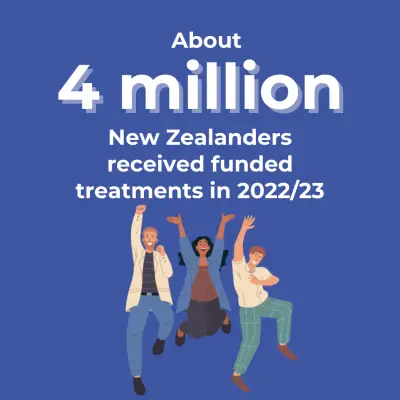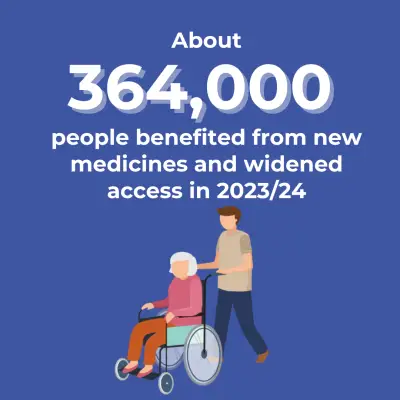How Pharmac works
New Zealand is the only country with a government agency like Pharmac.
On this page
Pharmac is the only agency in the world that both:
- decides what medicines to fund and
- manages a fixed budget for those medicines.
We do not approve medicines, that’s Medsafe’s role. They make sure medicines work as they’re supposed to.
The Pae Ora (Healthy Futures) Act 2022 sets out Pharmac's role. We are a government agency.
We do not make, buy, or sell medicines. We don't make a profit. We are given a budget by the Government and we invest all of it on making sure New Zealanders can access medicines.
It’s not all about funding new and more medicines
Many people focus on improving access to new medicines. But we know that many New Zealanders are not getting the funded medicines they need to live their healthiest lives. People affected by inequity include:
- Māori
- Pacific Peoples
- people who live rurally
It's not enough to define access solely based on whether a medicine can be prescribed to someone. It also matters that they can get it and use it. The medicines Pharmac funds can help people live better and healthier lives.
We want to improve access for all New Zealanders to the medicines we already fund. We believe this will have the greatest benefit to New Zealand.
Managing New Zealand’s medicine budget
The Pae Ora Act says Pharmac must decide which medicines to fund for the best health outcomes for New Zealanders, while staying within our budget.
When we talk about medicines, we are including related products, like insulin pumps, vaccines, and pregnancy tests.
In 2024/25, we have a budget of nearly $1.7 billion to spend on medicines in the community. We are investing all of it into medicines for New Zealanders.

We currently fund over 1,300 different chemicals (in over 3,300 different presentations). These are the medicines available in hospitals and from your local pharmacies.
Every year, the budget needs to pay for these funded medicines. If there is money left after that, we can consider funding new medicines.
Finding the money for new medicines
Since 2014, our budget has increased a little every year. These increases covered the costs of population growth and normal inflation. We sometimes get a big increase to meet a specific goal, such as the extra costs caused by COVID-19.
To free up enough budget to fund new medicines, we reduce the cost of the medicines we already fund. Once a medicine is funded, generally, it stays funded.
We've been very successful at negotiating the costs of medicines down. These savings have allowed us to fund more new medicines every year.
We report on how much we've saved and how we've used those savings fund more medicines.
How new medicines get funded
Before we can fund a medicine, we need an application to fund it. We receive most funding applications from pharmaceutical companies. We also accept applications from doctors and patients.
Ask the experts
Usually, our first step is to get our clinical experts' advice. 140 clinical experts make up our clinical committees. They assess all the scientific evidence for us.
Our experts are doctors, specialists, nurses and others who are treating people. These experts see how medicines and other treatments can improve people’s lives.
We have an overarching committee called Pharmacology and Therapeutics Advisory Committee (PTAC). There are also specialist advisory groups which advise PTAC.
What kind of advice we get
PTAC will recommend whether Pharmac should fund an application or not.
They may recommend we decline an application because it adds no value or is harmful.
PTAC might say that a medicine works well, but that we already fund medicines that are just as good. So they may recommend we only fund those medicines if they don’t cost us any extra (are cost neutral) or we can save money with them.
If they recommend we fund a medicine, they will give it a low, medium, or high priority.
What happens when the experts suggest we decline an application?
For transparency, we consult before we formally decline an application. Anyone can comment on the consultation.
We need to know all the costs and benefits
Following a recommendation from PTAC, we investigate the cost and benefits of each medicine. We don’t just look at how much, in dollar terms, a medicine costs. We look at a number of factors including:
- how improved people's lives might be and for how long with the medicine
- how much shorter or less healthy people's lives would be without the medicine
- how someone's whānau will be affected by a funding decision. For example, if whānau are caregivers, a treatment may reduce the level of care needed.
We give every funding application the same methodical analysis.

Deciding which new medicines to fund
We compare each application against all the other applications. We decide which medicines are our priorities to fund.
The priority of the medicines on our 'options for investment list' is a closely guarded secret. We need this secrecy to strengthen our bargaining position. If a pharmaceutical company thought their medicine was our top priority, they’d be in a position to ask us to pay more for it. This would leave less money in our budget for other medicines.
About our prioritisation process
When will the medicine be funded?
There is no set timeframe for funding a medicine. Once we have put a medicine on our options for investment list, there are many variables outside Pharmac's control that affect how long it may take to fund it.
Before we can fund a medicine, we need:
- a clear health benefit for New Zealanders
- a deal with a medicine supplier
- enough money in the budget to fund it this year, and in future years
- to consult on our proposal with everyone who may be interested.
Once these align, Pharmac works quickly to fund a medicine for New Zealanders.


